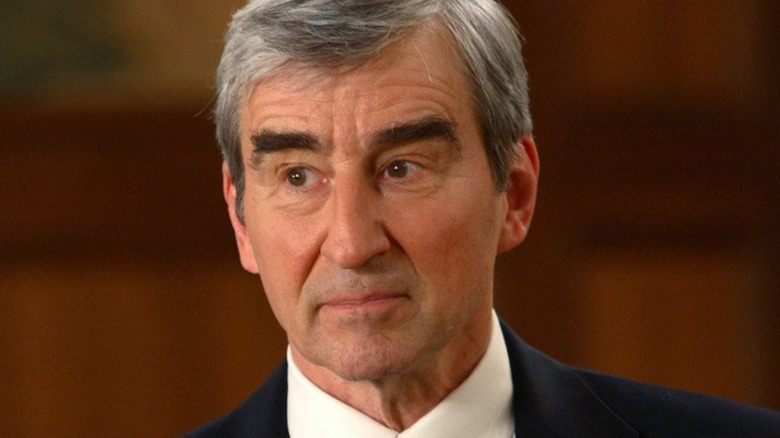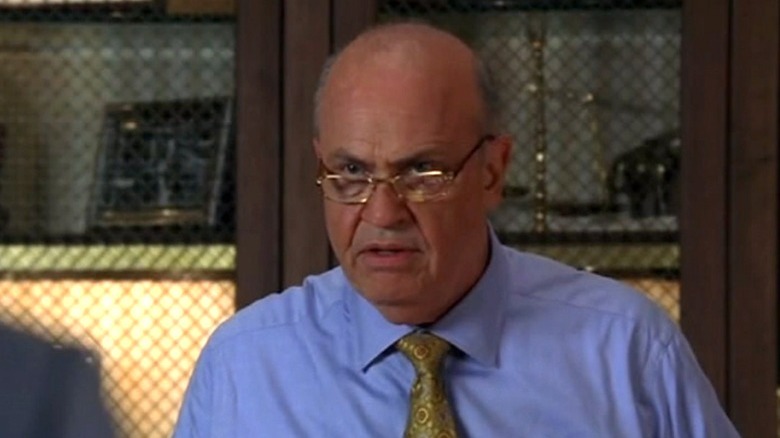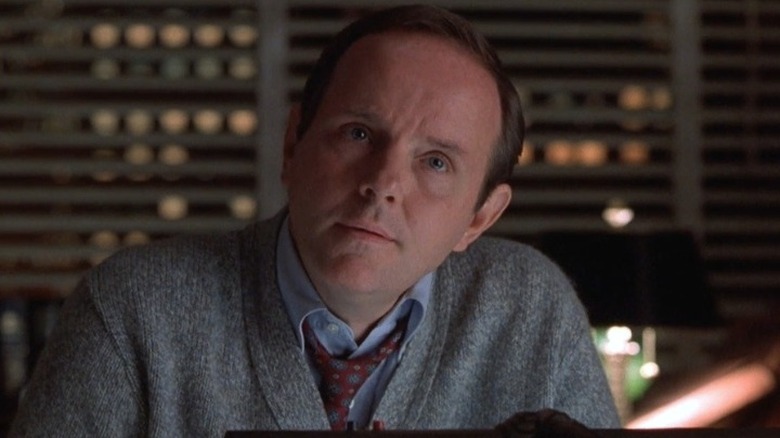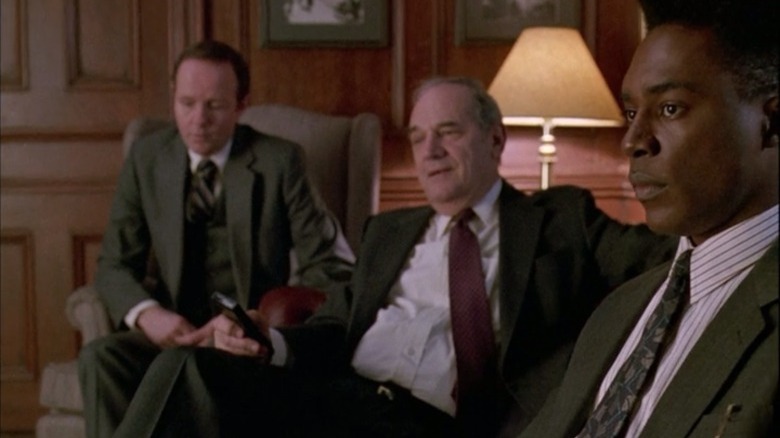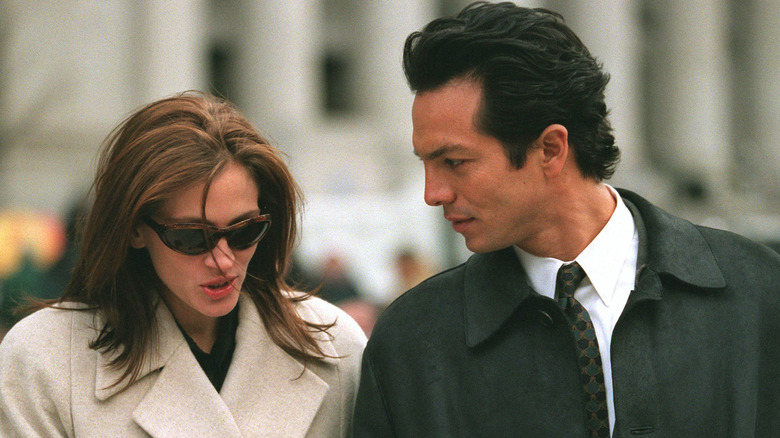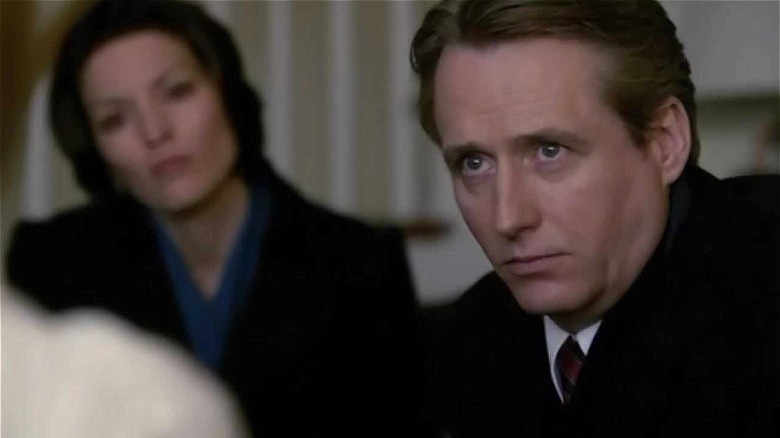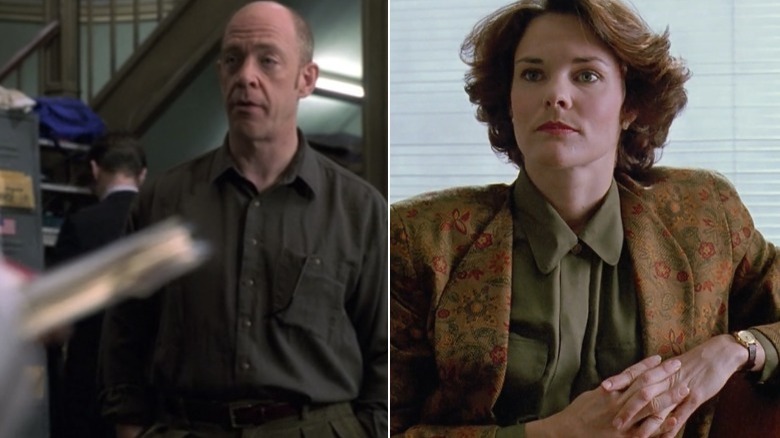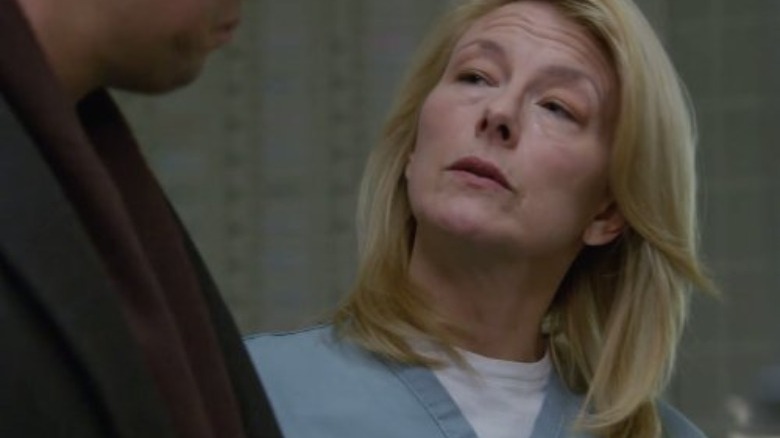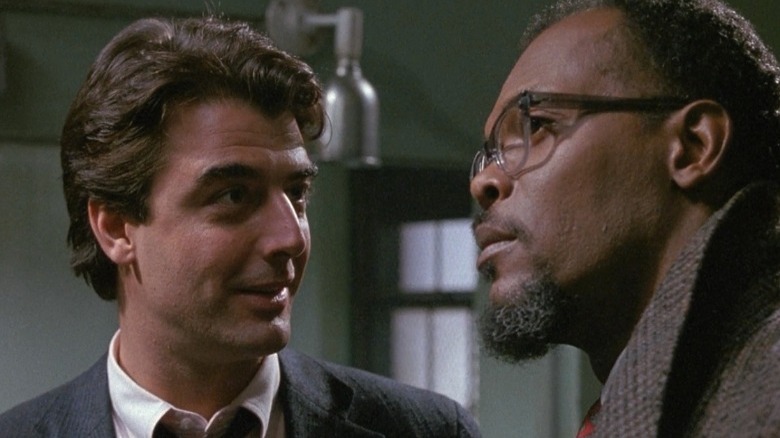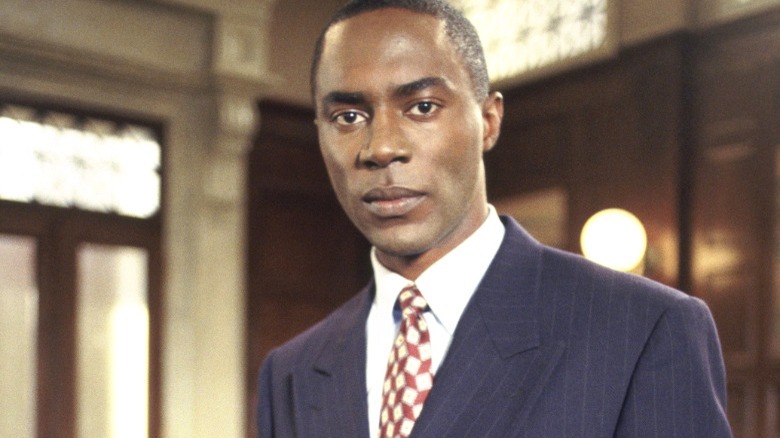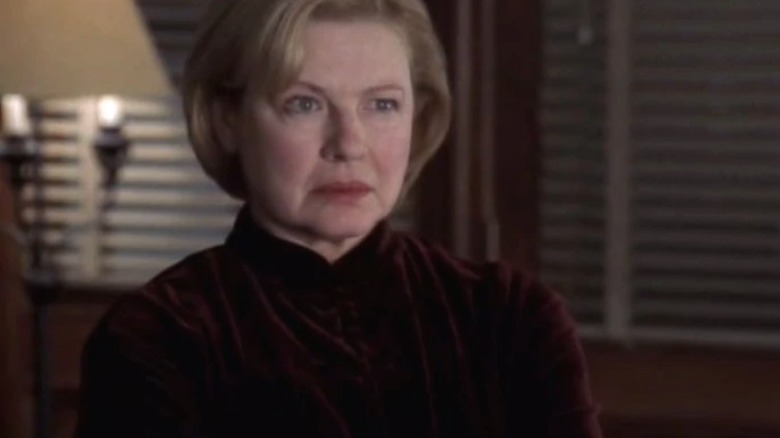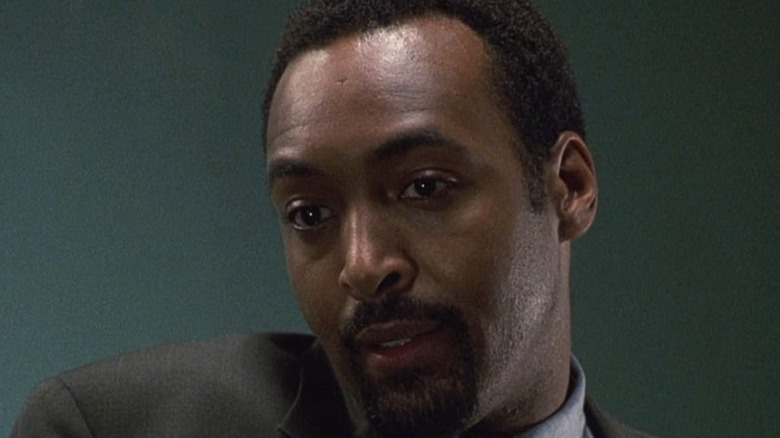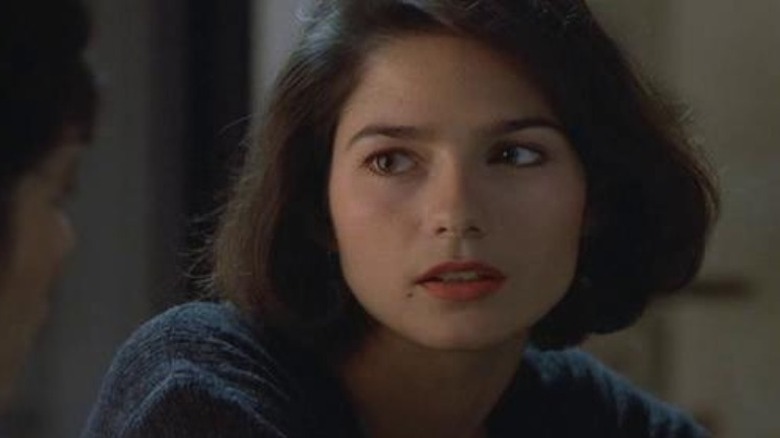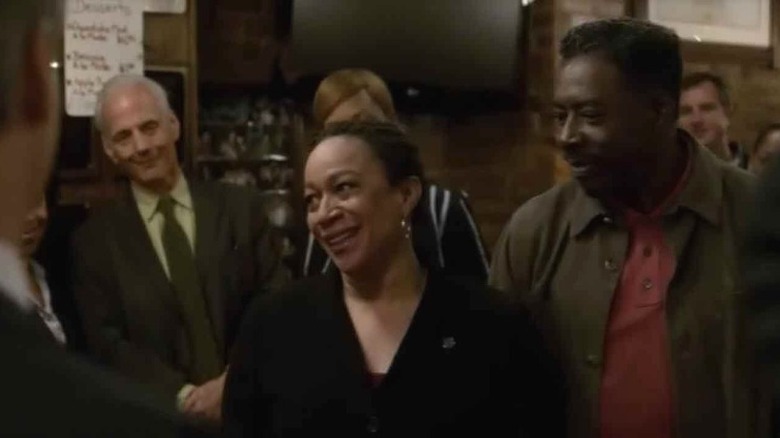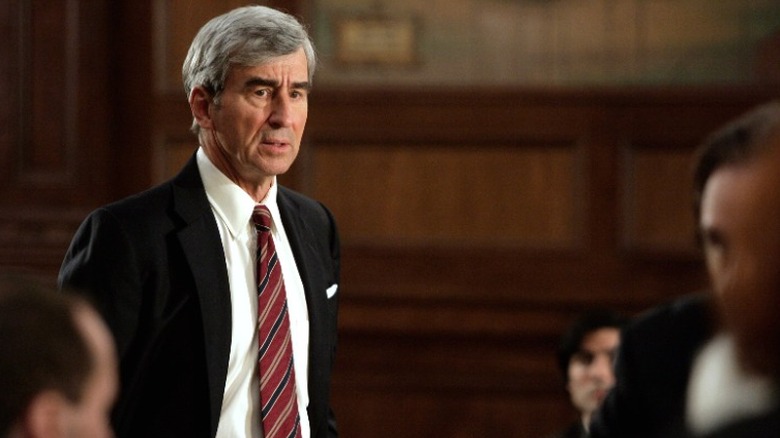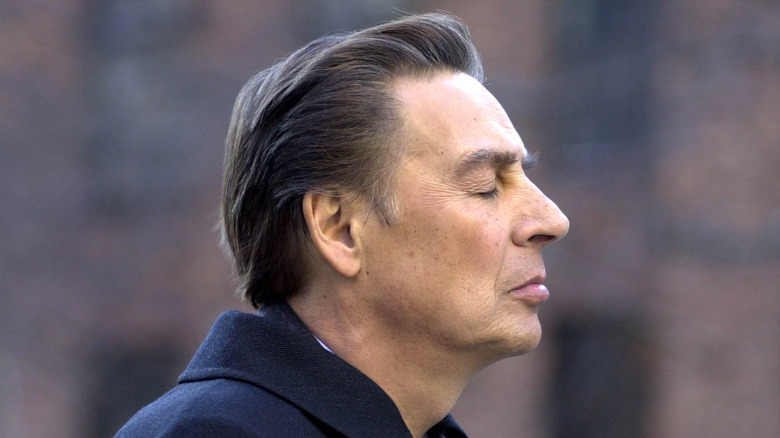The 15 Best Law & Order Characters Ranked
"Law & Order" is the series that just won't quit. The first episode of creator Dick Wolf's signature franchise aired in the fall of 1990 and would continue to thrive for another 20 years, generating six spin-off series, UK and Russian versions, and a TV movie. "Law & Order: Special Victims Unit" and "Law And Order: Organized Crime" are still on the air, with another spinoff, "Hate Crimes," waiting in the wings. Most exciting of all, the mothership itself, the OG "Law & Order" with its characteristic DONK-DONK, is on its way back.
Dualistic and trim, "Law & Order" makes for fine comfort food viewing. Approximately twenty-five minutes are spent with the detectives who, as they say, must investigate the crime, and the rest goes to the district attorney's office, who must prosecute the offenders. Formula shakeups are rare, the province of the Very Special Episode. The main cast becomes familiar, and their backstories are slowly doled out over the course of dozens or hundreds of episodes. Gradually, we choose our favorites. With "Law & Order" about to return with new crimes and new characters to enjoy, let's take a look back at 15 of these old friends.
15. District Attorney Arthur Branch
Love him or hate him, Fred Thompson's garrulous district attorney was the right post-911 response for a series headquartered in New York City. A staunch but sympathetic conservative, Arthur Branch oversaw the DA's office for five seasons, arriving in the autumn of 2002. He was a stabilizing force for an audience still nervous about the events of the year before, fair but firm. Today his personal politics are charming, mostly because they remained his personal politics and rarely informed the direction of the court itself.
If Branch had a hard time being beloved, it was because ADA Jack McCoy was already well entrenched with the audience. Watching the two of them butt heads meant we would choose sides, and we often preferred McCoy. Branch's legacy as a great but not beloved character is marred by two ugly moments. One is a god-awful episode where McCoy's assistant, Serena Southerlyn, is fired. The other, "Reality Bites," turns him into a reality TV punchline.
14. Executive Assistant DA Benjamin Stone
As the first prosecutor "Law & Order" fans got to know, Ben Stone seemed like a mild-mannered guy who favored concise language delivered in an almost monotone voice. But under that mask was a consistently angry and combative force; the type of man who'd call you 'sir' right before he hits you with his car. His relationship with his boss, Adam Schiff, was often respectful even when they disagreed. Unlike later DAs, Stone rarely went against Schiff's orders, though he would argue his side when he felt it butted up against his morals. Yet no matter what he felt, Stone would get the job done.
Stone served the office for four seasons, quitting when a witness he'd pressured into testifying was slain despite his efforts to protect her. It wasn't the first failure to be taken personally by Stone, but it would be the last. His departure marked the end of the first era of "Law & Order," setting the tone for all district attorneys to come.
13. District Attorney Adam Schiff
Adam Schiff was the quintessential grouchy old man. Not to be confused with the sitting U.S. Representative from California, Schiff was a quiet mover and shaker in the NY law scene. Typically seen hunched in his office chair while his assistants told him the latest news about the case they're trying in court, Schiff was James Bond's unlikely counterpart. Any situation, good or bad, called for a dryly delivered zinger. A favorite moment finds him lauding McCoy for a job well done, coupled with an offer to take the rest of the week off. It's Friday, realizes McCoy. "So it is," deadpans Schiff. "See you on Monday."
Schiff's passivity was key, showing he trusted his colleagues to get the job done. When Schiff did leave the office, it meant schnitzel got real. Trundling into a bar to sit with a colleague meant audiences got a look at these secret legal earthquakes. Schiff's departure at the end of the 10th season hit hard. No one else would be quite like Schiff. To their credit, no one else ever tried to be.
12. Detective Rey Curtis
Detective Curtis was reliable, earnest, and had a real problem with keeping it in his pants. It's unfortunate how often this trait came up, overriding his chance at a higher position on this subjective list. To the show's credit, he dealt with the consequences of his behavior in a realistic way, although the subplot of his wife's struggle with multiple sclerosis often felt unfair. Then again, chronic illness is unfair to the individual, never a convenience and always a trial. He was human in his failings, a good detective with personal blinders on. Sometimes this became a factor in his investigations. Like many immigrants and first-generation Hispanic kids, he was a faithful religious conservative with sometimes liberal concepts of the law.
Lennie Briscoe was slow to accept him after the departure of Detective Logan, although Curtis was less hot-headed and more attuned to the flexible cultural landscape of New York City. He heralded the coming technical changes to the business of being police, always hip to trends and easygoing with witnesses. Fun to watch and only occasionally self-righteous, Curtis made himself liked with ease.
11. Executive Assistant DA Michael Cutter
Michael Cutter took over the executive assistant DA's job when Jack McCoy was appointed by the state's fictional governor to District Attorney in 2008. Cynical and sometimes manipulative in the way he went about processing a case, Cutter was a hard sell. But he slowly grew on fans, especially this one. If nothing else, his best feature was his ability to make McCoy ask himself if he was always that annoying as an assistant district's attorney. The answer was yes, and that sweet karma gave Jack a good, long look in a mirror as cases from his past came back up via Cutter, over and over.
Cutter was arguably the most ruthless of the crew assigned to prosecute these ripped from the headline cases, so much so that in the final season, he proceeded to burn his bridges with Lieutenant Van Buren. In a case based on the real-life complexities around Henrietta Lacks and her immortal cells, Cutter made Van Buren's personal struggle with cancer an issue. It helped him win the case — and earned him Van Buren's ire throughout the final handful of episodes.
10. Dr. Emil Skoda and Dr. Elizabeth Olivet
The office of the District Attorney retains licensed mental health professionals to help assess suspects and witnesses where necessary. "Law & Order" represents this real world fact via the empathetic Dr. Elizabeth Olivet. She's typically gentle with the suspects she's assessing for the DA's office, and her long tenure on the show has given us a wealth of opportunity to get comfortable with her. The episode where she entraps her own rapist is tough viewing, showing not just her persistence, but the depth of care she shows her clients. She's a comfort in tough episodes.
Dr. Skoda is a psychiatrist with a contrasting edge. More enigmatic than Olivet, he keeps himself emotionally at arm's length. Often given the wilder, more blatantly psychopathic suspects, Skoda's earthy control of the situation makes him a great foil. His scenes with a truculent suspect are often the highlights of the episode, helped by the fact that he's played with cool competency by the Academy Award-winning J.K. Simmons.
9. Medical Examiner Elizabeth Rodgers
Appearing in over 130 episodes, Dr. Rodgers isn't a main character, but she's outlasted most of the folks that get top credit billing. She's the grand archetype of the long-timer medical examiner, minus some of the worst yet easiest cynicism to creep into a job like hers. She's pragmatic and calm, with a respectful amount of sarcasm and black humor. Her reliability and attitude makes her a prime target for virtuous cop flirtations, and she favors jeans when she pops into the offices to make clarifications on her work.
Her dedication to doing her job makes her scenes brief but useful. Once she makes a cause of death determination, it's a hard fact. The rare times that fact changes are a testament to that dedication; she's willing to go back and double check her work, or look for something that could have been missed. She's not a character we love for her deep character exploration, but for that centered factuality. We all wish we knew someone as reliable as Rodgers.
8. Detective Mike Logan
For many "Law & Order" fans, Detective Logan is the good-looking face of the show's early era, but his tenure wasn't as remarkable as memory makes out to be. He was hot-headed to a fault, with his departure from the show coming as the result of his cold-cocking a politician in the face (To be fair, the guy had it coming). Early episodes highlight the uglier parts of Logan's nature, with a low point being his hesitation to believe Dr. Olivet when she reports her rape at the hands of her gynecologist. It's not fair to judge him by his mistakes alone, however, and he still deserves to be lauded as one of the series' best leads.
A bit classist and blind to his prejudices, Logan was effectively human. He could and did grow, though his temper would remain. He was also surprisingly enduring. Though his departure from the mothership was ignoble, Logan would end up starring in the only spin-off movie made, "Exiled," and he would return to the franchise in "Law & Order: Criminal Intent" for four seasons.
7. ADA Paul Robinette
The difference between an executive assistant district attorney and an assistant district attorney comes down to supervision and scut work. The assistant DA is the one that files charges and asks for bail recommendations at an initial hearing. Once the case is in motion, the assistant is also the one doing the legwork. For Paul Robinette, the first ADA fans got to know over the course of the series, this kind of work can become deeply personal.
A young Black lawyer from Harlem, complex racial questions became an issue for Robinette despite his attempts to elevate his work beyond those questions. Stable and incorruptible, he held his own against Ben Stone's moralism, but the questions that arose from the work he did for the District Attorney would linger. Robinette's storyline continued even after he left office. Turning to private practice, Robinette's enemy as a defense lawyer wasn't his former colleagues so much as it was the institutionalized racism that left many of his young clients with nowhere to turn but crime.
6. District Attorney Nora Lewin
Temporarily appointed (by Rudy Giuliani himself, in a now-bizarre cameo) after Adam Schiff left office, Nora Lewin's term in office is the shortest in the series, and that's a shame. Lewin was a vibrant twist on the formula, with Dianne Wiest's lively attitude making sure she was never mistaken for matronly. Lewin was a law professor before she was installed, capable of assessing incoming cases from a logical but never lofty distance.
Lewin's tenure saw her apply ethical musings to the real world, though, and her personal ethics would be challenged more than once. In fact, those challenges were the hallmark of her run on the series. No fan of the death penalty, politics forced her to consider more than her own viewpoint when sending a murderer to death row. She was also called to testify before a grand jury investigating ADA Southerlyn's intervention in a hostage situation. Lewin's testimony untangled the legal nuance behind Southerlyn's involvement as a lawyer, but not the suspect's lawyer. Hesitant but truthful, Lewin upheld the laws she held dear.
5. Detective Ed Green
Detective Ed Green embodied what we think we remember of the Mike Logan era. Quick on his feet and adaptable to the times, Green also succeeded at the most important aspect of his era of "Law & Order" — keeping up with Lennie Briscoe. Green could be too passionate in his treatment of suspects, and in his early episodes, he wasn't above playing fast and loose with the laws that were supposed to bind him, too. But he grew up over time, though his human flaws continued to play in the background.
Green was an evolution of Curtis, increasingly comfortable with the new tech available to the NYPD. He also felt like a natural fixture of New York's society, a little of this, a little of that. A street-fluent officer, but considering his fondness for gambling, maybe a bit too fluent. It's partially that flaw that leads to his departure, a well-intentioned mess-up that puts him in the crosshairs of Internal Affairs.
4. ADA Claire Kincaid
ADA Kincaid replaced Paul Robinette and lasted for three seasons, acting as a bridge between the Stone and McCoy eras. It's a term that feels longer than it was, with Claire's connection with both Schiff and McCoy making her feel like she'd been there forever. For some, she was the best ADA, always prioritizing her caseload and without an overdose of the personal baggage that bogs down other legal dramas.
Like many of her peers, Kincaid epitomized efficiency. She found a niche in forcing McCoy to temper his borderline legal shenanigans in court, acting as his conscience when he'd try to leave his in his jacket pocket. Kincaid, for better and worse, is also the recipient of a final appearance that was actually heartbreaking in a world of cheap shock endings. A special episode that shows the impact of putting a criminal to death ends with Kincaid sacrificed to balance that moral weight. Her death had a lasting impact on both the show and its audience, despite the attempt to later paint her as another one of McCoy's conquests.
3. Lieutenant Anita Van Buren
Once Lieutenant Van Buren came on board, she stayed until the bitter end. Van Buren's composure and understanding of the deeper entanglements of law enforcement make her a bedrock of the series. A Black mother keenly aware of the pain other Black mothers are going through in a city that's been particularly tough on them, she also brooked no crap from the officers on her squad. It was a rough start for Van Buren, back in season 4 and with her squad wondering if she could make the cut. By the end, they'd all go to bat for her.
Van Buren is one of the few characters to bring a personal subplot into focus and make it feel like it matters. Her cancer diagnosis comes late in the series, and its progression can be seen on her face, heard in her exhausted voice. It became a platform to talk about the prejudices medical marijuana faced then and today, and it's a remarkable scene when her direct superior gives her tips on how to hide her use of it. It's a kind spoiler to know that she's set for a full recovery in the series finale.
2. Executive Assistant DA Jack McCoy
Jack McCoy, legal name John. J. McCoy, is a contentious old goat, a holier-than-thou stickler with Opinions, and he wants to make them the defendant's problem. Sometimes it's what you want to see in the DA's office. Other times, it's a reminder that the power the office wields can be abused, even with good intent. It keeps McCoy interesting, and his elected DA boss in a state of bewildered exhaustion. His clashes with Arthur Branch were often necessary and complex, with little to make it clear which of them was correct.
When Branch left and McCoy was appointed to helm the DA's office in his stead, it was a karmic victory. Many of McCoy's chickens had come home to roost, granting him the perspective he needed to temper himself at last. He remains resolute, a steadfast supporter to his crew; one excellent moment finds him supporting ADA Rubirosa after she's forced to act as a suspect's defense attorney when a labor strike gums up the gears of justice. The office is on the cusp of turning against her. He takes a stand against all of them, reminding all that this is how the law is supposed to work.
1. Detective Lennie Briscoe
Detective Briscoe is the heart and soul of classic "Law & Order." His presence across almost 300 episodes demarcates the series' golden age. His departure, and the death of Jerry Orbach in 2004, meant nothing would be the same again. Briscoe was beloved by crime fans and the real life NYPD for his acerbic sense of humor and tired-sounding but relentless drive. Briscoe was the epitome of the old-timer, a Vietnam vet who crawled his way up the ranks of the police force by simply doing the best job he could. No episode could get properly underway without a trademarked Lennie quip.
Lennie was never without flaws, adding to the depth of his role. Alcoholism was his specter, and his family ties were deeply tangled. He was estranged from his daughters, with one of them, Cathy, later murdered by her drug dealer. Emotional but controlled, acerbic but caring, Briscoe was the best cop "Law & Order" had. He mixed likability with professional distance, and the only shame of his career is that Orbach never got to bust out his Broadway lungs in song. We miss you, Lennie. Patrol well, wherever you are.
